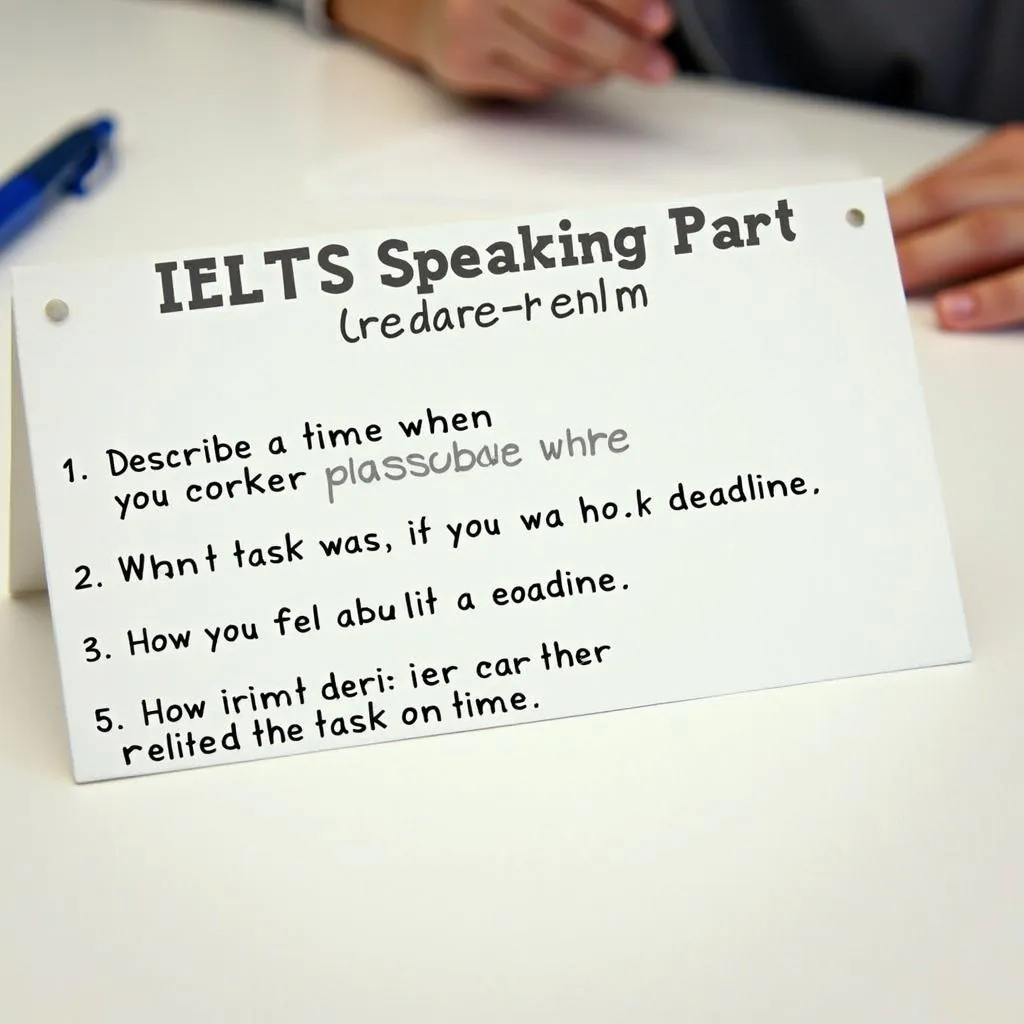Working under pressure to meet deadlines is a common experience that many IELTS candidates can relate to. This topic frequently appears in IELTS Speaking tests, particularly in Part 2 and Part 3. Being well-prepared to discuss this subject can significantly boost your confidence and score. Let’s explore how to effectively answer questions related to this theme across all parts of the IELTS Speaking test.
Nội dung bài viết
Part 1: Introduction and Interview
In Part 1, you may encounter questions that indirectly relate to working under pressure. Here’s a sample question with a suggested answer:
Question: Do you prefer to work with deadlines or without them?
Sample answer (Band 7-8):
“I actually prefer working with deadlines. They give me a clear target to aim for and help me stay focused. Without them, I tend to procrastinate. However, I do find that very tight deadlines can be quite stressful, so I prefer having a reasonable timeframe to complete my tasks.”
Describe a situation where you successfully handled a problem can be a related topic that might come up in the IELTS Speaking test, especially when discussing how you manage pressure at work or in studies.
Part 2: Long Turn
Here’s a sample cue card related to the topic:
Describe a time when you worked under pressure to meet a deadline.
You should say:
- What the task was
- Why there was a deadline
- How you felt about the situation
- And explain how you managed to complete the task on time
 IELTS Speaking Cue Card on Working Under Pressure
IELTS Speaking Cue Card on Working Under Pressure
Sample answer (Band 6-7):
“I remember a time when I had to work under immense pressure to meet a deadline for a group project at university. The task was to prepare a comprehensive marketing plan for a local business. We had a strict deadline because our proposal was going to be presented to the actual business owners.
I felt quite anxious about the situation because we had underestimated the amount of work involved. With only three days left, we realized we were far behind schedule. The pressure was intense, and I was worried we might not finish in time.
To manage the situation, I decided to take charge. I organized an emergency meeting with my team, and we divided the remaining tasks based on each person’s strengths. We agreed to work late into the night and communicate constantly via a group chat. I also reached out to our professor for some guidance, which helped us focus our efforts more effectively.
In the end, we managed to complete the project just hours before the deadline. It was exhausting, but the sense of accomplishment was incredible. This experience taught me valuable lessons about time management and teamwork under pressure.”
Sample answer (Band 8-9):
“I’d like to share an experience from my professional life when I was working as a junior software developer. We were tasked with developing a crucial update for our company’s main product, a customer relationship management system. The deadline was non-negotiable as it coincided with a major industry conference where our CEO was scheduled to showcase the new features.
The pressure was palpable from the outset. As the newest member of the team, I felt a mix of excitement and trepidation. The stakes were high, and I was acutely aware that my performance could significantly impact my future in the company.
To tackle this challenge, I employed several strategies. Firstly, I meticulously broke down the project into smaller, manageable tasks and created a detailed timeline. I also took the initiative to work closely with senior developers, absorbing their knowledge and asking for guidance when needed. To maximize productivity, I implemented the Pomodoro Technique, working in focused 25-minute intervals followed by short breaks.
As the deadline loomed closer, I found myself working late into the night, fueled by a combination of caffeine and determination. Despite the stress, I remained composed by practicing mindfulness techniques during my breaks.
Ultimately, not only did we meet the deadline, but we also exceeded expectations by incorporating additional features that weren’t initially planned. This experience was a turning point in my career, teaching me invaluable lessons about project management, the importance of clear communication, and how to thrive under pressure.”
Follow-up questions:
- How do you usually handle stress when working under pressure?
- Do you think the ability to work under pressure is an important skill in today’s job market?
Sample answer for question 1 (Band 8-9):
“When working under pressure, I’ve developed several techniques to manage stress effectively. Firstly, I prioritize tasks rigorously, focusing on the most critical aspects of the project. I also practice deep breathing exercises and short meditation sessions during breaks, which help me maintain clarity and focus. Additionally, I’ve found that regular exercise, even if it’s just a brisk walk during lunch, significantly reduces stress levels and boosts my productivity. Lastly, I maintain open communication with my team and superiors, as I’ve learned that seeking support and guidance when needed is not a sign of weakness, but a mark of professionalism.”
Sample answer for question 2 (Band 8-9):
“Absolutely, I believe the ability to work under pressure is an indispensable skill in today’s fast-paced job market. In our increasingly globalized and competitive world, businesses often operate with tight deadlines and high stakes. Employees who can maintain their composure and deliver quality work under pressure are invaluable assets to any organization. This skill demonstrates resilience, adaptability, and problem-solving abilities – all of which are highly sought after by employers across various industries. Moreover, in an era of rapid technological advancements and shifting market dynamics, the ability to thrive under pressure often separates high-performing professionals from the rest.”
Part 3: Two-way Discussion
In Part 3, the examiner might ask more abstract questions related to working under pressure. Here are some potential questions and sample answers:
Q1: Do you think young people today are under more pressure than previous generations?
Sample answer (Band 7-8):
“I believe young people today do face more pressure in many ways compared to previous generations. The job market has become increasingly competitive, requiring higher levels of education and a broader skill set. There’s also the added pressure of maintaining a perfect image on social media, which wasn’t an issue for earlier generations. However, it’s worth noting that each generation faces its own unique challenges, so it’s difficult to make a definitive comparison.”
Sample answer (Band 8-9):
“It’s a nuanced issue, but I would argue that young people today indeed face a unique set of pressures that differ significantly from those experienced by previous generations. The rapid pace of technological advancement means that young people must constantly adapt and upskill to remain relevant in the job market. Moreover, the global nature of today’s economy has intensified competition, often requiring young professionals to compete on an international scale.
Additionally, the pervasive nature of social media has created a new form of social pressure, where one’s life is constantly on display and subject to comparison. This can lead to increased anxiety and a feeling of always needing to present a perfect image.
However, it’s important to acknowledge that every generation faces its own set of challenges. While the pressures may be different, it doesn’t necessarily mean they’re more intense. Previous generations had to contend with issues like economic recessions, political instability, and more limited access to information and opportunities.
In essence, while the pressures on young people today are significant and unique, it’s perhaps more accurate to say they’re different, rather than definitively more intense than those faced by previous generations.”
Q2: How can companies help their employees manage work-related stress?
Sample answer (Band 7-8):
“Companies can help employees manage work-related stress in several ways. They could offer flexible working hours or the option to work from home, which can help employees balance their work and personal lives better. Providing access to counseling services or stress management workshops could also be beneficial. Additionally, fostering a positive work culture where employees feel valued and supported can go a long way in reducing stress levels.”
Sample answer (Band 8-9):
“There are numerous strategies companies can employ to help their employees manage work-related stress effectively. Firstly, implementing a robust employee wellness program that encompasses both physical and mental health can be incredibly beneficial. This could include offering gym memberships, organizing yoga or meditation sessions, and providing access to mental health professionals.
Secondly, fostering a culture of open communication is crucial. Employees should feel comfortable discussing their stress levels with their supervisors without fear of repercussion. Regular check-ins and anonymous feedback systems can facilitate this.
Another key aspect is workload management. Companies should strive to distribute work evenly and set realistic deadlines. Encouraging employees to take regular breaks and utilize their full vacation time can also help prevent burnout.
Furthermore, offering flexible working arrangements, such as remote work options or flexible hours, can significantly reduce stress by allowing employees to better balance their work and personal lives.
Lastly, providing professional development opportunities can help employees feel more confident and competent in their roles, which can naturally reduce work-related stress.
By implementing a combination of these strategies, companies can create a supportive environment that not only reduces stress but also boosts productivity and employee satisfaction.”
Describe a project you worked on that was challenging is another topic that often involves discussing pressure and deadlines, making it relevant to our main discussion.
Key Vocabulary and Phrases
To score high in your IELTS Speaking test when discussing working under pressure, consider using these advanced vocabulary items and phrases:
-
To thrive under pressure (phrasal verb) – /θraɪv ˈʌndə ˈpreʃə/
Meaning: To perform well in stressful situations
Example: “Despite the tight deadline, Sarah thrives under pressure and always delivers excellent results.” -
Time management (noun) – /taɪm ˈmænɪdʒmənt/
Meaning: The ability to use one’s time effectively or productively
Example: “Effective time management is crucial when working on projects with strict deadlines.” -
To prioritize (verb) – /praɪˈɒrətaɪz/
Meaning: To organize things so that the most important thing is done or dealt with first
Example: “When faced with multiple tasks, it’s essential to prioritize and focus on the most critical ones first.” -
To meet a deadline (phrase) – /miːt ə ˈdedlaɪn/
Meaning: To complete something by the time it is required
Example: “Despite the challenges, we managed to meet the deadline for the project submission.” -
Stress management (noun) – /stres ˈmænɪdʒmənt/
Meaning: Techniques for coping with or reducing stress
Example: “The company offers stress management workshops to help employees cope with work-related pressure.”
 IELTS Speaking Vocabulary for Describing Work Pressure
IELTS Speaking Vocabulary for Describing Work Pressure
Examiner’s Advice
As an IELTS examiner, I recommend the following strategies to excel in the Speaking test, particularly when discussing topics like working under pressure:
-
Practice regularly: Familiarize yourself with common IELTS topics and practice speaking about them fluently.
-
Use a variety of sentence structures: Mix simple and complex sentences to demonstrate your language proficiency.
-
Incorporate idiomatic expressions naturally: Use them where appropriate, but don’t force them into every sentence.
-
Develop your answers: Provide examples and explanations to support your points.
-
Stay calm: Remember, the examiner is interested in your language skills, not judging your personal experiences.
-
Listen carefully: Make sure you understand the question fully before answering.
-
Be honest: If you don’t have a specific experience to share, it’s okay to talk about a hypothetical situation or what you think you would do.
By following these tips and using the sample answers as inspiration, you’ll be well-prepared to discuss working under pressure in your IELTS Speaking test. Remember, the key is to speak naturally and confidently while showcasing your English language skills.
Describe a situation where you had to use your problem-solving skills is another topic that can be related to working under pressure, as problem-solving skills are often crucial in high-pressure situations.


